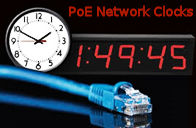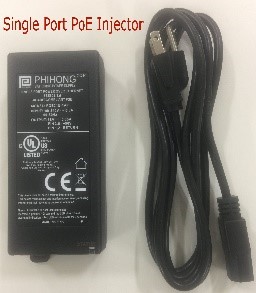 Watts in your Network
Watts in your Network
PoE synchronized network display clocks allow you to leverage your existing Cat5e/Cat6 network wiring. The power is supplied through a PoE switch or PoE injector, drawing both power and time updates from your organization's ethernet connection. This can significantly reduce your installation cost, eliminating the need for AC receptacles or the use of batteries.
Each display clock plugs into the standard jack of any Ethernet-based local area network. Once connected to an active network the display clock then obtains NTP time updates automatically over the facility’s data network displaying the same time as your network time source.
Your clock options
- 4-digit and 6-digit LED digital
- Digital 2.5 in, 4 in, 6 in, 9 in or 12 in display’s
- Analog 12” or 16”
- Message Clocks
Cost Savings:
- Use your existing Cat5/Cat6 PoE infrastructure - no need to modify existing switches or cabling reducing your cabling cost.
- No need to install power outlets – no licensed electrician’s required to install outlets.
- PoE clocks use minimal wattage - therefore "green" and energy-efficient.
- Avoid the manual maintenance involved with checking and replacing battery-powered clocks.
- Automatically updates for Daylight Saving Time.
Safety
- Designed to protect equipment from electrical overload under-powering or incorrect installation.
- If there is damage to a cable, the power is stopped no sparking or fires.
Flexibility
- Install end-device where there is no local power.
- Easily install devices whereever there is an ethernet cable.
- Easily add additional clocks or other PoE devices in the future.
Functionality
- Can be backed up by an Uninterruptible power supply (UPS) – this allows the clocks and other Ethernet-powered devices to operate even through a power failure.
- Clocks can be programed to get time updates from your network NTP time source so all clocks will be synchronized with network time
 You may already know all about Power over Ethernet (PoE) technology. You may be well-versed in the low power consumption, cost-effectiveness, and ease of installation for the hundreds of modern devices that utilize the technology, such as VoIP phones, webcams and other devices including syncronized digital and analog clocks,
You may already know all about Power over Ethernet (PoE) technology. You may be well-versed in the low power consumption, cost-effectiveness, and ease of installation for the hundreds of modern devices that utilize the technology, such as VoIP phones, webcams and other devices including syncronized digital and analog clocks,
What is Power over Ethernet, Anyway?
Power over Ethernet technology is a network standard that allows various devices, such as Voice over IP (VoIP) telephones, wireless LAN access points, clocks, and digital signs to receive both power and data over existing LAN cabling. In 2003, PoE became an international standard, called IEEE 802.3af, as an extension to existing Ethernet standards.
PoE is fully compatible with both powered and non-powered 10/100BaseT Ethernet devices, featuring a "discovery process" specifically designed to prevent damage to existing Ethernet equipment.
The IEEE 802.3af standard imposes a power limit of 15.4 watts, enough to operate small devices such as digtial and analog clocks or digital signs without sacrificing LED brightness or device quality.
IEEE PoE Standards
IEEE 802.3af - Ratified in 2003
- Allows up to 15.4W per connection
- 95W assued to be available at the Powered Device at 100 M
IEEE 802.3at PoE+ - Ratified in 2009
- Allows up 30.0W per connection
- 5W assued to be available at the Powered Device at 100 M
IEEE 802.3bt – 60W – 100W High-Power PoE - Ratified in 2018
- Allows up to 100W per connection
- 71W assued to be available at the Powered Device at 100 M
 If a PoE capable switch or router is not available, there is no need to modify your existing Ethernet switch equipment or cabling to support PoE. Simply add a single PoE midspan power injector in a switch room or at the endpoint to inject power into the twisted pair LAN cables.
If a PoE capable switch or router is not available, there is no need to modify your existing Ethernet switch equipment or cabling to support PoE. Simply add a single PoE midspan power injector in a switch room or at the endpoint to inject power into the twisted pair LAN cables.
The Phihong manufactured single port PoE injector plugs in to an AC outlet and converts 120V power to low voltage. Plug an Ethernet cable in to the RJ45 jack and connect your PoE display clock and you're powered up!




